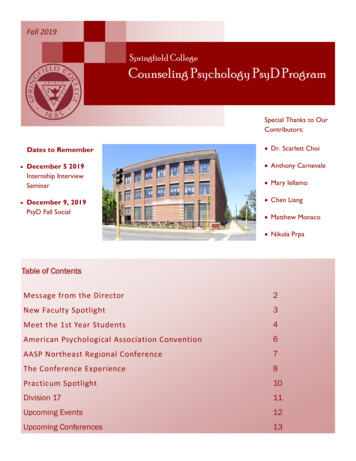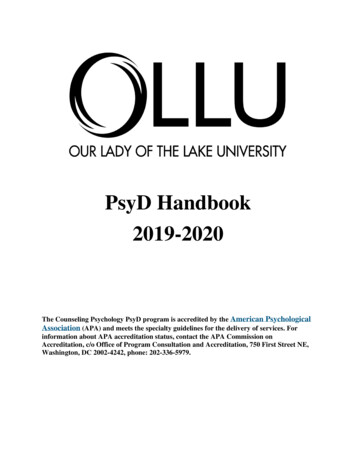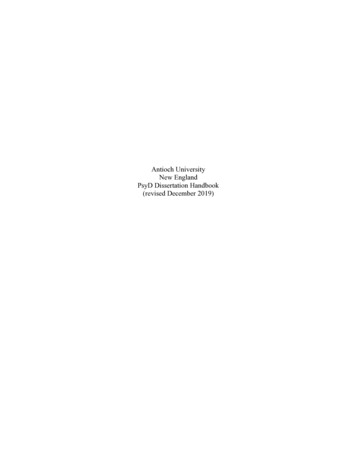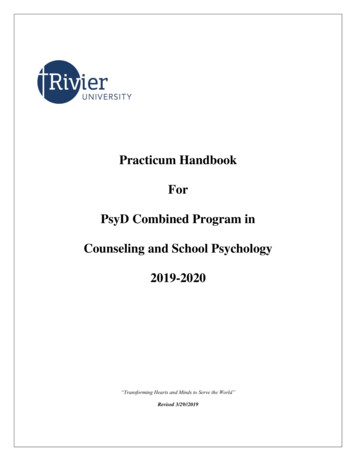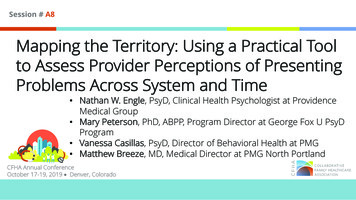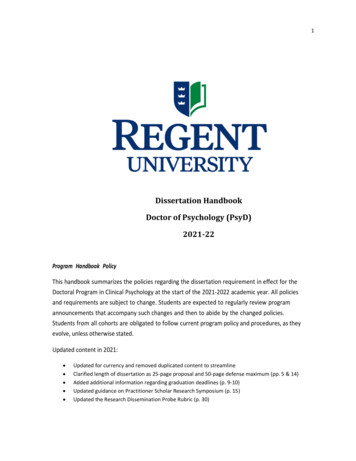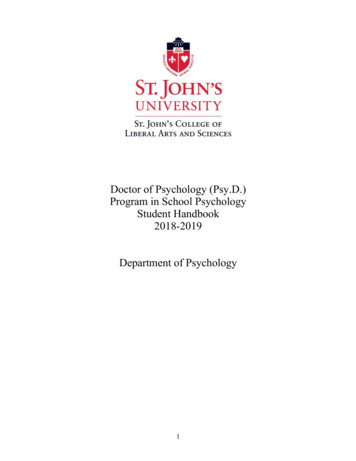
Transcription
Doctor of Psychology (Psy.D.)Program in School PsychologyStudent Handbook2018-2019Department of Psychology1
Table of ContentsPageI. Overview of the School Psychology Program . .6A History of School Psychology at St. John’s University . .6B. Program Philosophy . . .1. Program Mission2. Program Goals and Objectives3. Professional Psychologists’ Oath66610C. Financial Support . .1. Assistantships and Fellowships1010II. Policy and Procedures . . 10A. Academic Standing . . 10B. Full and Part Time Study . .11C. Advisement and Registration . . .11D. Continuous Enrollment . 12E. Time Limit . .12F. Attendance Policy . .12G. Grading . .1. Incomplete Grades2. Missing the Final Examination3. Withdrawal Grades4. Probation1213131414H. Final Examinations . .14I. Transfer Credits . .14J. Program Degree Requirements . 15K. Student Work Policy . .15L. Malpractice / Professional Liability Insurance . . 15M. Academic Integrity .16N. University Policy on Harassment and Discrimination . 16O. University Guidelines Determining Eligibility for Services for Students withDisabilities . P. International Students . .Q. Grievance Policy . .1819192
R. Remediation Policy: Handling & Remediating Student Difficulties 20III. Structure of the School Psychology Program . .21A. Schedule for Full-Time Students: General Track . . .B. Bilingual Program . . . .1. Schedule for Bilingual StudentsC. Schedule for Students with Advanced Standing . . . D. Registration for Doctoral Research Credits . . . . . E. Description of Required Courses . . . .F. Electives . . . .G. Elective Concentrations .H. First Year Research and Community Service Commitment1. Research Commitment2. Community Service Commitment3. Brown Bag Research Luncheons212325272929363840404141I. St. John’s University Center for Psychological Services and Clinical StudiesJ. Third Year Field Placements . . .K. Fourth Year Externship . . .L. Fifth-Year Doctoral Internship for Licensing . .1. Prerequisites2. APA Approved Internships3. Non APA Approved InternshipsM. Externship for Advanced Standing Students . .N. Advanced Standing Students Doctoral Internship for Licensing .O. Annual Feedback . . .P. Praxis: School Psychologist Examination . . .Q. Comprehensive Examination . .1. Eligibility2. Qualifying to Take the Examination3. Completing the Examination4. Grading the Comprehensive Examination5. Instructions for the Comprehensive Examination6. Failure of the Comprehensive Exam414245464747485153565657575758585961R. Professional Practice Competency Examination . . 1. Exam Schedule2. Grading of the Professional Practice Competency Examination3. Failing the Professional Practice Competency Examination4. Professional Practice Competency Examination6161616161S. Doctoral Dissertation . . 1. Deadlines63653
2. Internal Review Board (IRB)3. FAQsT. Graduation . .U. Certification and Licensing .1. School Psychology Certification2. Psychology License3. Foreign Students4. Certification and Licensure in other states5. Required WorkshopsV. Professional Organizations . .1. NASP2. APA3. SASP4. NYASP5. NYSPAW. Student Requirements for the APA Annual Report66676768686869696970707070707171Appendices . . 72Appendix A . Statement on Plagiarism and Learning Exercises72Appendix B . First Year Research and Community Service Commitment Contracts78Appendix C . Third Year Field Placement ContractAppendix D . Fourth Year Externship Contract83Appendix E . Fifth Year Internship ContractAppendix F . Third Year Placement Planning FormAppendix G . .Fourth Year Externship Planning FormAppendix H Fifth Year Internship Application Form (for non-accredited placements)Appendix I . Assessment Practicum Evaluation FormAppendix J . Third Year Externship Evaluation FormAppendix K . Fourth Year Externship Evaluation Form87485899499102106111
Appendix L . Intervention Practicum Evaluation FormAppendix M . . Fifth Year Internship Evaluation FormAppendix N . Annual Student Progress ReportAppendix O . Philosophy of Best Practices in Conducting Psychoeducational AssessmentsAppendix P .Comprehensive Examination Scoring RubricAppendix Q .Questions for the Assessment Comps Level III – Initial EvaluationAppendix R .Questions for the Assessment Comps Level III – Re-Evaluation116Appendix S .Professional Practice Competency Exam Evaluation FormAppendix T .Dissertation Planning FormsAppendix U .Testing Kit PolicyAppendix V . . .NASP Standards for Training and Practice1495121126128131140145158166168
I. OVERVIEW OF THE SCHOOL PSYCHOLOGY PROGRAMA. HISTORY OF THE SCHOOL PSYCHOLOGY PROGRAM AT ST. JOHN'S UNIVERSITYThe School Psychology Program was founded in the early 1960’s on the Queens campus and was the firstgraduate program in psychology at St. John’s University. The program began as a result of an invitationfrom the New York State Education Department through Rev. John Flynn, C.M., and then President of St.John's University. Shortly afterwards, in 1976, the program evolved into a Ph.D. in Professional ChildPsychology and a Masters/Certificate Program in School Psychology. During the 1980’s, the program wasmoved from the School of Education to the Department of Psychology of the St. John’s College of Artsand Sciences where it remains today. Currently, the Department of Psychology offers a 66-hour MastersDegree Program in School Psychology and a Psy.D. Program in School Psychology. The SchoolPsychology Psy.D. Program has been accredited by the American Psychological Association (APA) sinceApril of 2007 and is also approved by the National Association of School Psychologists (NASP).B. PROGRAM PHILOSOPHY1. Program MissionThe School Psychology Program offers doctoral level training that culminates in the Doctor ofPsychology (PsyD) degree. The program follows a practitioner-scientist model that is designed to ensurethat school psychologists base their professional activities on a scientific understanding of humanbehavior, lifespan development, and the social and cultural influences of behavior. The mission of thisprogram is to train future psychologists who will apply basic psychological knowledge to address theneeds of children, families, and professionals in general and special educational settings.Our students are trained to address these needs based on scientific review and evaluation. Specificemphasis is placed on providing students with competency to understand the unique needs of and provideservices to underserved populations. The specific aims of our program are to prepare a) scientificallyknowledgeable school psychologists; b) highly skilled professionals who can integrate and applyknowledge of psychological theory to educational practice in the service of promoting academic andsocial development of school age children; c) professionals to utilize educational practice to inform andextend psychological theory.2. Program Goals and ObjectivesThe Program’s doctoral training achieves an integration of science and practice via the prescribedsequence of coursework that includes several practica and fieldwork experiences, as well as requireddemonstrations of competency that involve successfully passing the Praxis: School PsychologyExamination and the Program's comprehensive examinations and the successful defense of thedissertation project.The Program requires four, full-time, in-residence years of graduate study and the completion of afulltime, doctoral internship during the fifth year. The Program’s version of the practitioner-scientistmodel of training is demonstrated throughout the training sequence, research opportunities, coursework,research projects, and field-work experiences; and is an appropriate integration of the science and practiceof psychology.The Program’s training model is sequential in nature, logically building upon prior training and increasingin complexity as students progress from year to year. The early exposure to practica experiences areclosely linked to skill-based courses in assessment and intervention and effectively prepare students forincreasingly more independent fieldwork experiences in their 3rd, 4th and 5th years in the program.6
Additionally, opportunities to engage in faculty-led research are available to students early in thesequence. Taken together, completion of the Program prepares students to function independently asscientifically knowledgeable, highly skilled professionals who can integrate and apply knowledge ofpsychological theory and empirically-supported assessment, consultation and intervention practices to theservice of promoting the cognitive, academic, social-emotional and behavioral development of children,adolescents and young adults, and to utilize educational practice to inform and extend psychologicaltheory. The specific goals and objectives of our PsyD program, that were adapted according to theNational Association of School Psychologists’ (NASP, 2010) Model for Comprehensive and IntegratedSchool Psychological Services are specified below.Goal 1. To Foster Skills in Data-Based Decision-Making and AccountabilityObjectives: Use student data to identify student’s strengths and needs, and measure progress andaccomplishments Understand theories and methods of assessment and diagnosis Diagnose or define problems through psychological assessment and measurement Formulate and implement intervention strategies, including training in empirically supportedproceduresGoal 2. To Foster Students' Consultation and Collaboration SkillsObjectives: Understand a variety of consultation models (e.g. behavioral, mental health, collaborative) Collaborate effectively with others in the planning and decision-making processes at theindividual (child) level Collaborate effectively with others in the planning and decision-making processes at the group(classroom) level Collaborate effectively with others in the planning and decision-making processes at the system(school or school district) level.Goal 3. To Foster Students’ Development of Cognitive/Academic SkillsObjectives: Develop appropriate cognitive and academic goals for students with different abilities Implement interventions to achieve cognitive and academic goals for the students with whom youworked Evaluate the effectiveness of cognitive and academic interventionsGoal 4. To Foster Students’ Development of Socialization and Development of Life SkillsObjectives: Increase knowledge in human developmental processes Develop appropriate behavioral, affective, adaptive, and social goals for students of varyingabilitiesGoal 5. To Foster Student Diversity in Development and Learning7
Objectives: Understand the manner in which culture influences human behavior and development Work with individuals of diverse characteristics (individual differences, abilities, and disabilities).Goal 6. To Develop Students’ Understanding of School and Systems Organization, Policy Development,and ClimateObjectives: Provide educational services (e.g. general education, special education) Create effective learning environments for children and others Understand models of supervision (e.g. mental health, behavioral) Engage in the practice of supervisionGoal 7. To Develop Students’ Skills in Prevention, Crisis Intervention, and Mental HealthObjectives: Understand psychopathology and associated influences on biological aspects of human behavior Understand psychopathology and associated influences on cognitive aspects of behavior Understand psychopathology and associated influences on social aspects of behavior Assess psychopathology Prevention and intervention programs that promote the mental health and physical well-being ofstudentsGoal 8. To Foster Home/School/Community CollaborationObjectives: Understand family systems and methods to involve families in education and service delivery Work effectively with families, educators, and others in the community to promote and providecomprehensive services to children and familiesGoal 9. To Develop Skills in Research and Program EvaluationObjectives: Understand research, statistics, and data analysis techniques Evaluate research and translate research into practice Understand research design and statistics in order to plan and conduct investigations and programevaluations for improvement of servicesGoal 10. To Foster an Understanding of School Psychology Practice and DevelopmentObjectives: Understand the history and foundations of psychology Understand the history and foundations of the profession of school psychology Understand various service models (i.e., direct, indirect) and methods in school psychologypractice (i.e. assessment, consultation, intervention) Understand public policy development applicable to services to children and families Understand ethical, professional, and legal standards in the practice of school psychology8
Become a life-long learner, conduct scholarly inquiries, and solve problems professionallyGoal 11. To Foster Skills in Using Information TechnologyObjective: Understand information sources and technology relevant to your work to enhance the quality ofservices deliveredGoal 12. To demonstrate professional performance and proficiency at a level that is consistent with thedoctoral level degreeObjectives: Deliver psychological services that integrate the practitioner-scientist model below of the program Present doctoral dissertation projects that demonstrate knowledge of varied approaches to datacollection, analysis, interpretation, and applicationTo meet the specified goals and objectives of the program, courses, practica, externships, and internshipprovide the students with the following experiences: Conducting individual psychological assessments of preschoolers, children, adolescents, andyoung adults.Implementing individual and group short-term counseling and psychotherapy withpreschoolers, children, adolescents, and their families.Assessing the needs of special populations of children, adolescents, and young adults anddeveloping programs to meet their needs.Consulting with teachers and educators about academic, behavioral, and social problems ofindividuals.Consulting with school administrators to evaluate and implement educational policy andeducational instructional methods.Developing individual educational plans for exceptional children.Consulting with parents about academic, behavioral, and social problems of individual children.Performing program evaluations.Developing preventive mental health programs for regular and special education populations.Providing crisis intervention services.Providing support groups for parents, students, and teachers.Discussing the legal and ethical standards involved in the delivery of school psychology services.Designing programs to meet the mental health needs of children, adolescents, young adults andtheir families.Students become familiar with the varied roles and functions of the school psychologist. The programexposes students to professional school psychologists in a variety of educational contexts: preschool,elementary, intermediate, secondary and college settings; special educational programs; Committees forSpecial Education; community mental health centers; and in residential, day, and hospital programs forexceptional children. We accomplish this through the diverse experiential learning opportunities, practica,field placements, and internships provided in the second, third, and fourth years of course work.3. Professional Psychologists’ Oath9
The Psy.D. Program at the Philadelphia College designed the following oath of Osteopathic Medicine.We believe it represents the values and philosophy of our program. All students take the oath beforepracticum and internship experiences.I (state your name) hereby affirm that I shall discharge the responsibilities of my profession in amanner consistent with respect for the dignity and worth of the individual, and that I shall strivefor the preservation and protection of fundamental human rights; That I shall seek to increaseknowledge of human behavior, to evaluate the effectiveness of my professional activities, toincrease self-understanding and understanding of others, and that I shall use such knowledge forthe promotion of human welfare; That I shall diligently protect the welfare of those who seek myservices, and that I shall use my skills to further human welfare and the integrity of the individual;And that I recognize and honor the traditions and ethics of the profession of psychology.C. FINANCIAL SUPPORT1. Assistantships and FellowshipsThe University awards a limited number of Graduate Assistantships and Fellowships annually to qualifiedgraduate students. Assistants and Fellows are generally appointed to the Department of Psychology wherethey work 15 - 18 hours per week in support of faculty research. Additional assistantships are available inboth academic and nonacademic departments throughout the University. Individual departments may havespecific criteria for the consideration of assistants. The applicant should contact the Graduate Division ofSt. John’s College for more information. The University requires recipients to maintain a fulltime courseof study and work a minimum of fifteen hours per week in their respective department. The assistantshipsprovide tuition remission for a maximum of fifteen credits and sometimes, a stipend. Recipients areprohibited from outside employment for the duration of their contract with the University. Applicants forassistantships must also complete a Free Application for Federal Student Aid (FAFSA) and a New YorkState Tuition Assistance Program (TAP) application. Both forms are available in the Office of FinancialAid.II. POLICY AND PROCEDURESA. ACADEMIC STANDINGAll students must maintain a 3.0 grade point average to continue in the program. Students who fail tomaintain a 3.0 average, either during a particular semester or in their cumulative record, are automaticallyplaced on academic probation by the college. Once on academic probation, the Program Director, Chair,or the Dean may limit the student’s program. Students on academic probation cannot sit for the third yearcomprehensive examination or the fourth year professional practice competency examination. While onacademic probation, students must meet with the Program Director to arrange an appropriate, correctivecourse of action. It is the student’s responsibility to meet with the Program Director.B. FULL AND PART TIME STUDYFull-time study means enrollment for at least nine (9) credits per semester, or the equivalent. Students arerequired to attend three (3) years of full-time enrollment or the equivalent thereof. At least two (2) ofthese years must be at St. John’s University if the student has transferred from another graduate degreeoffering institution. Equivalent full-time enrollment requires that the student enrolls for a minimum of six10
(6) credits and is completing the third or fourth year externship, which involves three (3) days per week ata field placement. Students may complete their internship either full-time for one (1) year or half-time fortwo (2) years.C. ADVISEMENT AND REGISTRATIONEach student will receive a letter at the initial orientation identifying his or her advisor from thedepartment. Advisors provide guidance and advocate for students throughout their time in the program.Advisors will help students choose classes, discuss any problems in meeting the program requirements,and consult with the students concerning practicum, field placement, and internship experiences. Eachstudent must meet with his or her advisor at least once a semester during advisement periods to preregister for the following semester's work. In addition, each student must arrange at least one meetingwith his or her advisor during his or her internship.The advisor will sign the Graduate Registration Form, and give the student his or her priority registrationnumber. The student will give the Program Administrative Assistant the top two sheets of the form.Registration is completed by using St. John’s University’s online registration system.A bill for tuition and fees is then sent to the student and the student can complete registration online.Please note, courses with small enrollments may be canceled. If a student is unable to meet with his or heradvisor, only a core School Psychology faculty member can sign a student’s registration form.Under no circumstances will the University permit a student to enroll in a class after the late registrationperiod ends, even if a student has been unofficially attending a class. Once a student receives a classschedule receipt, he or she is officially enrolled for the courses listed on the receipt. If a student wishes towithdraw from a course or change sections for a course, the student must obtain and complete the Changeof Program form from the Graduate Division’s Office. Unless a student officially withdraws from acourse by following these procedures, the student will receive a final grade of "F" on his or her permanentrecord.When there are two or more sections of a particular course, the department and the program reserves theright to direct students into particular sections of a course. This means a student may not get into aspecific section of a course they had wanted.If a student has any problems with his or her course work, practicum experiences, field placement, orinternship experiences, or if the student has difficulty with unprofessional contact by any faculty memberor supervisor, the student should first discuss such problems with their advisor. If the student believes thematter has not been resolved satisfactorily he or she should proceed up the chain of command and consultwith the Program Director, the Department Chair, the Associate Dean for Graduate Studies, and, finally,the Dean of St. John's College.D. CONTINUOUS ENROLLMENTContinuous enrollment until graduation is mandatory for all students enrolled in degree programs.Students who fail to enroll in course work MUST maintain their active status by enrolling in theappropriate "Maintaining Matriculation" course during the scheduled registration period. Student whoregister for Maintaining Matriculation are no longer considered full-time status and will be required tobegin payments on any student loans they may have. Those students who fail to maintain continuousenrollment for one semester must:11
1. Apply for readmission2. Meet the requirements of the program in effect at the time of reapplication3. Be readmittedE. TIME LIMITStudents must fulfill all requirements within seven years. Students may request to extend the time forobtaining the Psy.D. degree if they are unable to devote their full time to graduate study. Please note thatdegree credit will not count for courses completed more than seven years before the granting of thedegree. If a student takes longer than seven years to complete the degree, he or she may have to retakecourses more than seven years old. Advanced Standing students must fulfill all requirements within fiveyears.F. ATTENDANCE POLICYFaculty expect all students to attend classes regularly. No penalty exists for absence from class, unless aprofessor specifies in the course materials that class participation is part of the grade. Under nocircumstances will students be excused from work missed. Students will always be held responsible forall announced exams and assignments at the proper due date. Individual faculty members determinewhether or not a student is to receive a make-up examination. Please note, this policy does not apply tofinal examinations (refer to Section H: "Final Examinations”).G. GRADINGThe letter system for assigning grades and the quality points associated with each grade are as follows:Grade:AAB BBC CFINC IncompleteABF Absent/FailureWD WithdrawalPPassingAUAuditQuality Points:4.03.73.33.02.72.32.0000000The grade points earned for a course are derived by multiplying the points corresponding to the grade asdepicted above by the number of semester hours of credit attached to that course. The total grade pointsfor all courses divided by the total number of credits yields the quality point index.Psy.D. students must receive a “B” or better to get academic credit in all courses.Students who receive a grade below a “B” in any course must retake the courses until they receive a “B”12
or better. Students may not enroll in 614 unless they have successfully completed 608 with a grade of “B”or better. Students may not enroll in 662/662B unless they have earned a grade of “B” or better in 661.In addition, students may not enroll in 715 and 761 unless they have received a grade of “B” or better in661 and 662/662B. Students may not enroll in the internship courses (752/752B, and 753) if they have anincomplete in the practicum courses (761/761B, 762/762B).A grade of “F” will result in: (1) immediate academic probation and (2) review by the Graduate EducationPlanning Committee (GEPC) for determination of suspension or termination of the student’s program. If astudent wishes to formally appeal a grade, they should contact St. John’s College to obtain a copy of theAcademic Fairness Procedure document. This document outlines the recommended informal and formalroutes for students to follow.1. Incomplete GradesThe individual professor has the discretion to decide if a student can receive an incomplete grade(INC). Students must receive formal approval from the professor to take an INC before the end ofthe semester. Students receiving an INC grade (e.g., failing to submit a term paper or researchproject) must submit the missing work to the Dean's Office, not to the professor. The due date forremoving incomplete grades appears in the Academic Calendar and is approximately two monthsafter the start of the following semester. If a student desires a longer extension period, he or shemust make a request in writing. Approval for such requests must come from the professor, Chair,and Dean's Office before the deadline. Failure to do so will result in a permanent incomplete andthe student must repeat the course if it is required in the program. If a student receives an INC inhis or her final semester, he or she will automatically be removed from the graduation list. Failureto take the final examination does not qualify as a reason for an incomplete grade. This action hasa separate grade category with different consequences.2. Missing the Final ExaminationStudents who, for whatever reason, fail to take or complete the final examination in a coursereceive a grade of ABF. The professor must submit the make up examination to the Dean's Office.The Dean’s Office will administer the examination. Students must report to the Dean’s Officeimmediately to determine the schedule for make up examinations. The Dean’s Office sets thisdate, not the professor. If a student fails to take the make up examination, the ABF grade will beconverted to a grade of F.3. Withdrawal GradesIf a student withdraws from a course with the Dean's permission any time before the date indicatedin the Academic Calendar, he or she will receive a grade of WD (Withdrawal). The date ofwithdrawal is the date the Dean signs the "Change of Status" form, which students can obtain inthe Dean's Office. To withdraw from a course, students must have the necessary form signed bythe Dean before the final five weeks of class. After that time, a student may not officiallywithdraw from a course.To allow for greater precision in assigning final grades, the University has adopted the mark ofUW ("unofficial withdrawal"). Typically, the mark of UW would be assigned to a student who: a)never attended class; b) attended so sporadically that there is no basis for assigning an earnedgrade; or c) who stopped attending without explanation and for whom there is insufficient basis13
for assigning an earned grade. The mark of UW does not affect a student's GPA.The UW is intended to provide faculty with an option to be used at their discretion and toeliminate the ambiguity that results from practices that allow the mark of WD to signify both anofficial and an unofficial withdrawal and the grade of F to signify both an earned failure and anunofficial withdrawal. Individual faculty are free to determine the circumstances under which themark of UW is assigned.4. ProbationStudents whose GPA falls below a 3.0 will be placed on academic probation and do not qualify tosit for the third year comprehensive examination or the fourth year Professional PracticeCompetency Exam. The Chair, Director, and Dean's Office re
JOHN'S UNIVERSITY The School Psychology Program was founded in the early 1960's on the Queens campus and was the first graduate program in psychology at St. John's University. The program began as a result of an invitation from the New York State Education Department through Rev. John Flynn, C.M., and then President of St. John's University.


